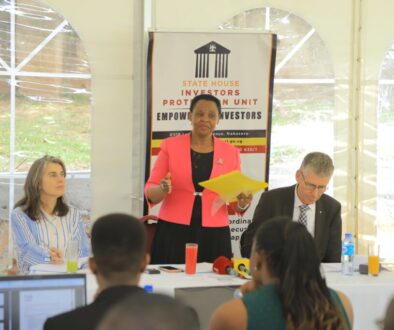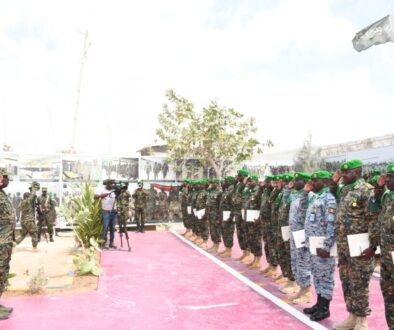African Union calls for summit on Sudan war

By Our reporter
ADDIS ABABA – The Peace and Security Council (PSC) of the African Union (AU) Friday June 21st, 2024 called for an extraordinary summit to address the escalating war in Sudan between the Sudanese army and the Rapid Support Forces (RSF).
The decision was made during the 1218th meeting held at the level of Heads of State and Government on June 21, chaired by Ugandan President Yoweri Kaguta Museveni, PSC Chairman, with the participation of Moussa Faki Mahamat, Chairperson of the AU Commission; Mohamed Ibn Chambas, Chair of the AU High-Level Panel on Sudan, Workneh Gebeyehu, IGAD Executive Secretary, and Ahmed Aboul Gheit, Executive Secretary of the League of Arab States.
The meeting “Proposes the convening of an extraordinary summit of the AU to consider the situation in Sudan; and, in this regard, requests the AU Commission, in consultation with the Chairperson of the Union, to consult on the date and venue of the aforementioned extraordinary summit,” read a communiqué issued after the meeting.
The PSC stressed that a ceasefire can only be achieved through direct negotiations between the key actors in the war. To facilitate this, an Ad-hoc Presidential Committee has been established, comprising one Head of State and Government from each region of the continent and led by President Museveni. This committee will focus on facilitating face-to-face engagements between the leaders of the Sudanese Armed Forces and the Rapid Support Forces.
The statement called upon the Chairman of the Transitional Sovereignty Council and the RSF Commander to meet under the auspices of the AU and IGAD without further delay.
The IGAD and the Saudi-US-led Jeddah process tried to organize such a meeting but they failed because Sudan military leaders accused the IGAD of bias and asked the Jeddah mediators to bring the RSF to implement a previous agreement signed in May 2023 before such a meeting.
The Council commended the efforts of the AU High-Level Panel on Sudan and IGAD in organizing the upcoming all-inclusive Sudan political dialogue process in Addis Ababa from July 10 to 15, 2024. The PSC also recognized the ongoing efforts by Egypt to facilitate dialogue among Sudanese actors in Cairo, scheduled for early July 2024.
The regional body urged all Sudanese actors to actively support the political dialogue towards a durable, people-driven solution to the conflict and the restoration of constitutional democratic order in Sudan.
Concerning the humanitarian situation, the Council demanded an immediate and unconditional ceasefire to end the suffering of the Sudanese people. The PSC also strongly called upon the belligerents to grant humanitarian access and protection to humanitarian workers, ensuring the provision of emergency assistance to those in need.
President Museveni said the war in Sudan was caused by the ideological mistakes by the country’s leaders.

“It is now 70 years since our neighbouring country which is part of this region has been in war more or less continuously and this has been because of some mistakes which we many times talk about with the Sudanese leaders. The first mistake was the politics of identity of Africans Vs Arabs or vice versa, Identity of religions; Muslims Vs Christians. This is the reason that caused war for a long time, and we normally talked to Sudanese leaders like Gen. Bashir and this is the problem also in other parts of Africa. Even in Uganda here, we had the same problem; people who were pushing the politics of identity instead of the politics of interest of the people. I am this religion, I am that tribe. This was the original problem,” he said.
The President highlighted mistake number two as using force and arms instead of using dialogue.
“Mistake number three, when you use force, you use unprepared people who are not disciplined and have got a wrong ideology yet armed with internal and external forces. That is how you get this catastrophe, the one you are seeing. Even if it is a war, it does not need to affect the whole population unless there’s something wrong with the managers of that conflict,” he noted.
“The war crimes are because of those mistakes. Therefore, I am very happy with the Security Council and other members who have attended.
They are all begging the Sudanese factions to please stop the war now, have a ceasefire, go for dialogue and hand the country to its owners; the Sudanese people vote for the person they want.”
Mr. Moussa Faki Mahamat, the Chairperson of the African Union Commission informed the meeting that as leaders they must do all it takes to ensure that ceasefire is realised in Sudan.
“The African Union, with the implementation of the decisions of your council, we have been engaging all those in the spectrum of the conflict to facilitate the peace process,” he said.
“The protection of human rights and the International Humanitarian law will only be possible if national reconciliation is realised. It is for this reason I call for the strengthening of international solidarity to ensure democratic transition in Sudan leading to free and fair elections in order
to avoid all sorts of crises that could create further chaos in the country and the region.”
Mr. Mahamat also commended President Museveni for his efforts in facilitating the peace process in Sudan.
The IGAD Executive Secretary, H.E. Dr. Workneh Gebeyehu also briefed the meeting on the need for coordinated peace efforts among partners and friends of Sudan.
“We must prioritise the Sudanese people who have suffered immensely. IGAD remains committed to finding a path to peace for our Sudanese brothers and sisters, believing that despite the tragic year of war, there is still hope for a peaceful resolution,” he said.
Dr. Mohamed Ibn Chambas, Chairperson of the African Union High Level Panel on Sudan said the conflict in Sudan is worse than that in Ukraine and Gaza.
He emphasised that the situation has reached a degree of urgency that requires bold action by the Peace and Security Council.
“Sudan is headed for an unprecedented hunger crisis. The vast majority of the hunger spots are in areas ravaged by 15 months of fighting and out of reach of humanitarian aid. Over two million people are facing emergency and even catastrophic levels of hunger. 75 people are dying each day of hunger and disease in Zam Zam camp alone. More than 15,000 fatalities have been recorded and at least 10 million people have also been displaced. such figures are horrific and are a reason for us all to act with urgency to end the conflict,” he noted.
On the other hand, the leaders demanded that warring parties namely, the Rapid Support Forces (RSF) and the Sudanese Armed Forces (SAF) immediately stop the fighting and prioritise the interest of Sudan and its people.
They also emphasised that there’s no viable and sustainable military solution to the conflict and that only a genuine dialogue can lead to a sustainable solution to the current situation.
The leaders further emphasised the need to ensure the protection of civilians in Sudan and in this regard, requested the AU Commission in coordination with the African Commission on Human and People’s Rights to investigate and make recommendations to the Peace and Security Council on practical measures to be undertaken for the protection of civilians.


